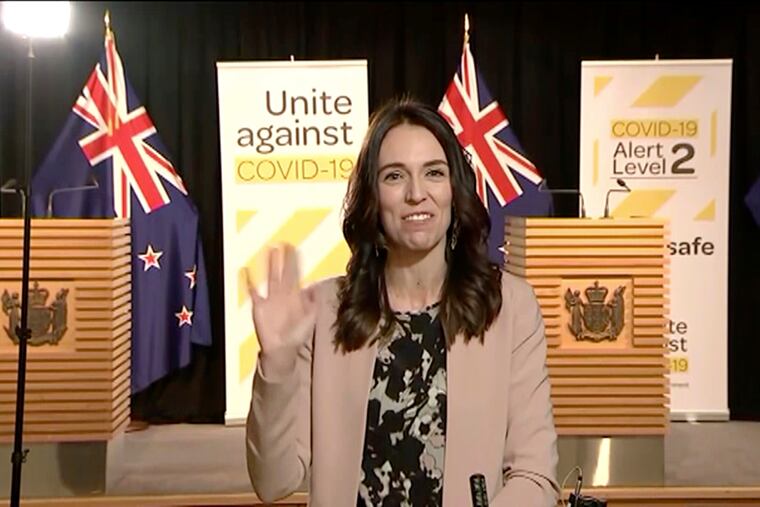While Europe, Asia reopen from COVID-19, America sets global example of doing it wrong | Trudy Rubin
Washington ignores lessons from democracies that have quashed the coronavirus: strong health systems, respect for science, more testing and tracing — and leaders who don't politicize the fight.

If you lived in Tokyo, you could visit a bar or karaoke parlor or museum or movie theater this weekend. New COVID-19 cases in that city of 14 million people are averaging under 20 per week, and nearly all businesses have reopened.
If you lived in Germany, hotels, museums, galleries, restaurants, and bars have reopened, along with bus and boat tours. But don’t buy your tickets if you’re an American. Visitors from countries with high rates of coronavirus infections, such as the United States, are banned for now.
If you lived in New Zealand, you could boast that the virus was virtually eradicated at present, with all restrictions lifted. There had been no new cases reported since June 8, until two New Zealanders returning home from Britain recently tested positive, sparking a swift contract tracing operation by the government.
» READ MORE: Memorial Day should have inspired unity, not red-blue state divisions I Trudy Rubin
On and on goes the lengthy list of countries in Asia and Europe that have handled COVID-19 far better than America, from South Korea, Vietnam, and Taiwan to impoverished Greece and little Denmark.
Meantime, the U.S. is the world leader in bad statistics, with 2,100,000 infections and 118,000 virus deaths (and nearly 1,000 Americans still dying daily). It is competing with Brazil (led by populist Trump clone Jair Bolsonaro) for the global lead in new cases reported per day. Infections — and hospitalizations — are spiking in red states that are reopening in the South and Southeast.
A president who disdains science and publicly rejects masking and social distancing, who views the virus as a political hoax, is effectively acting as a national super-spreader.
“If we stop testing right now, we’d have very few cases, if any,” President Donald Trump wrongly claims, encouraging his base to abandon health precautions. This just before his scheduled mass indoor rally in Tulsa, Okla., at which those reserving seats were required to pledge they wouldn’t sue the Trump campaign if they became sick.
There is not the slightest sign the White House has any interest in learning from fellow democracies with successful anti-virus efforts. On the contrary, the president awaits a magic vaccine bullet.
But the rest of us must learn from abroad, because we can’t afford to live in fantasyworld.
First, some insights on masking. Japan, which was slow on testing and didn’t wholly lock down, has reported only around 17,000 cases and 900 deaths in a population of 126 million.
So why are they doing so well?
Theirs is a culture where citizens commonly mask to protect against pollution; they did so near universally to protect themselves and others from COVID-19. Officials urged them on, and the results speak for themselves.
A second key factor is strong national leadership that treats the virus as a national threat, not a political annoyance. German Chancellor Angela Merkel, a scientist by training, avoided partisan rhetoric and rallied leaders of her state governments to the virus challenge. “She did a great job communicating to the public how dangerous the virus was and how important solidarity is,” I was told in April by Anna Sauerbrey, deputy editor-in-chief of the Berlin daily Der Tagesspiegel.
Similarly, in New Zealand and Australia, leaders mobilized their publics early in the pandemic to follow health restrictions. Hawkish Aussie Prime Minister Scott Morrison addressed his citizens regularly on conservative radio shows while forming a national cabinet of federal and state leaders to work on virus issues. New Zealand’s leftish Jacinda Ardern used Facebook Live to rally her public with warmth and statistics.
Both listened to their scientists, and provided resources for front-line workers and hospitals. Australia, with 25 million people, has had only 102 deaths. New Zealand, with a population of five million, only 22.
Of course, strong health systems played key roles in countries that crushed COVID-19. Intensive care beds were plentiful in Germany. Front-line health workers didn’t have to worry about getting, or paying for, tests in Germany, or Japan, New Zealand, Australia, South Korea or Taiwan, as many still have to do in the U.S.
In Taiwan, where former Vice President Chen Chien-jen (who left office last month) is an epidemiologis, the strong respect for scientists and medical professionals helped crush the illness. Fewer than 10 people have died, despite Taiwan’s geographical closeness to China.
In South Korea, the head of their Centers for Disease Control and Prevention (modeled on the U.S. agency) gave regular briefings to the public, unhampered by interference from political officials. What a sad contrast to the CDC here, a once-great agency that has been hollowed out in recent years, and pushed aside by Trump.
» READ MORE: To restart the economy Trump should pay attention to the So. Korea model I Trudy Rubin
Most success stories abroad also featured intense testing and tracing campaigns, far more strategic and better organized than the chaotic process U.S. states can muster without federal leadership. Instead, Trump calls testing “overrated” and fails to understand its purpose or critical importance.
There is nothing successful Asian or European allies have done that is beyond America’s capacity. It is the political will and the seriousness of purpose that is lacking.
Make America Great Again has morphed into Make America Sick Again. The only possible cure depends on the outcome of the election five months from now.